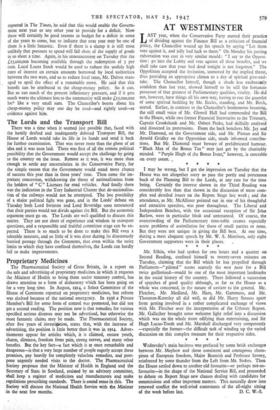Proprietary Medicines
The Pharmaceutical Society of Great Britain, in a report on the sale and advertising of proprietary medicines in which it requests the Minister of Health to bring them under statutory control, has drawn attention to a form of dishonesty which has been going on for a very long time. In August, 1914, a Select Committee of the House of Commons reported on proprietary medicines, but reform was shelved because of the national emergency. In 1936 a Private Member's Bill for some form of control was promoted, but did not get a second reading. The position now is that remedies for various specified serious diseases may not be advertised, but otherwise the most fantastic claims may be made. The Pharmaceutical Society, after five years of ,investigation, states that, with the increase of advertising, the position is little better than it was in 1914. Adver- tisements appear for articles which, it is ciiimed, ensure youth, charm, slimness, freedom from pain, strong nerves, and many other benefits. But the key fact—a fact which is at once remarkable and dangerous—is that a very large number of people eagerly accept these promises, pay heavily for completely valueless remedies, and post- pone urgently needed visits to the doctor. The Pharmaceutical Society proposes that the Minister of Health in England and the Secretary of State in Scotland, assisted by an advisory committee, shall keep a register of medicines and manufacturers and make regulations prescribing standards. There is sound sense in this. Tice Society will discuss the National Health Service with the Minister in the next few months.


































 Previous page
Previous page